|
|
|
Sort Order |
|
|
|
Items / Page
|
|
|
|
|
|
|
| Srl | Item |
| 1 |
ID:
157419
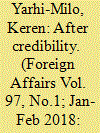

|
|
|
|
|
| Summary/Abstract |
Believe me.” U.S. President Donald Trump has used that phrase countless times, whether he is talking about counterterrorism (“I know more about ISIS than the generals do. Believe me”), building a wall along the U.S.-Mexican border (“Believe me, one way or the other, we’re going to get that wall”), or the Iran nuclear deal (“Believe me. Oh, believe me. . . . It’s a bad deal”).
|
|
|
|
|
|
|
|
|
|
|
|
|
|
|
|
| 2 |
ID:
153939


|
|
|
|
|
| Summary/Abstract |
Can states credibly communicate their intentions through covert policy tools, despite the absence of credibility-enhancing publicity? Most extant research suggests covert action and secrecy in general are uniquely uninformative and often used as an alternative to signaling. Yet episodes such as Richard Nixon's secret bombing of Cambodia suggest that leaders have used covert action to convey intentions and coerce adversaries. This article builds a theoretical framework for understanding signaling in the covert sphere, developing reasons why states find covert communication both intelligible (that is, the basic intended message is understandable) and credible (that is, the message is believable). We argue that two target audiences—local allies and strategic adversaries—tend to observe covert action and that the costs and risks incurred by initiating and expanding covert action credibly convey resolve. We assess our arguments empirically through careful process tracing of a set of nested covert interventions by Soviet and American leaders in conflicts in Angola and Afghanistan. Drawing on a trove of recently declassified material, we assess intentions and inferences related to covert signaling. We find that both strategic adversaries and local partners observed and drew inferences about resolve. Covert lethal aid programs thereby served as a credible indicator of resolve through three mechanisms we identify in the paper: sunk costs, counter-escalation risks, and domestic political risks. These findings have important implications for the study of coercive bargaining, secrecy, and reputation. They also shed light on an important policy tool contemporary policymakers will likely use, suggesting the kinds of effects covert action has and elucidating the basic interpretive framework needed to communicate messages with new methods like covert cyber attacks.
|
|
|
|
|
|
|
|
|
|
|
|
|
|
|
|
| 3 |
ID:
122084
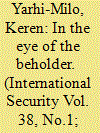

|
|
|
|
|
| Publication |
2013.
|
| Summary/Abstract |
How do policymakers infer the long-term political intentions of their states' adversaries? A new approach to answering this question, the "selective attention thesis," posits that individual perceptual biases and organizational interests and practices influence which types of indicators a state's political leaders and its intelligence community regard as credible signals of an adversary's intentions. Policymakers often base their interpretations on their own theories, expectations, and needs, sometimes ignoring costly signals and paying more attention to information that, though less costly, is more vivid (i.e., personalized and emotionally involving). In contrast, intelligence organizations typically prioritize the collection and analysis of data on the adversary's military inventory. Over time, these organizations develop substantial knowledge on these material indicators that they then use to make predictions about an adversary's intentions. An examination of three cases based on 30,000 archival documents and intelligence reports shows strong support for the selective attention thesis and mixed support for two other approaches in international relations theory aimed at understanding how observers are likely to infer adversaries' political intentions: the behavior thesis and the capabilities thesis. The three cases are assessments by President Jimmy Carter and officials in his administration of Soviet intentions during the collapse of détente; assessments by President Ronald Reagan and administration officials of Soviet intentions during the end of the Cold War; and British assessments of Nazi Germany before World War II.
|
|
|
|
|
|
|
|
|
|
|
|
|
|
|
|
| 4 |
ID:
156710


|
|
|
|
|
| Summary/Abstract |
This paper explores the question of how major powers signal support for their protégés. We develop a theory that explains why major powers show support for some protégés using highly visible “frontstage” signals of support, while supporting other protégés through less visible, but nonetheless costly, “offstage” signals. From an international strategic perspective, it is puzzling that major powers do not always send the most visible signal possible. We argue that this can be explained by considering the domestic environments in which the leaders of major powers and protégés operate. Focusing particularly on the United States as we develop our theory, we argue that the US will prefer to send offstage signals of support for more autocratic protégés for several reasons. First, sending frontstage support signals for autocracies would expose US leaders to charges of hypocrisy. Second, frontstage signals of support for autocracies face an impediment to credibility because of the public backlash in the United States that overt support for dictators could generate. Third, many autocratic protégés would be reluctant to accept a frontstage signal of support from the US because it could undermine their regime stability. We test our theory in a data set that records various support signals sent by the United States for other countries between 1950 and 2008, finding strong support for our expectations. We also find evidence of the causal mechanisms posited by our theory in a case study of relations between the US and the Shah's Iran.
|
|
|
|
|
|
|
|
|
|
|
|
|
|
|
|
| 5 |
ID:
192024


|
|
|
|
|
| Summary/Abstract |
The conventional wisdom in international relations holds that an actor’s past record of keeping her word determines her cooperative credibility, and that mutual perceptions of credibility are essential in sustaining cooperation. Yet competing reputation-skeptic and psychological perspectives dispute this conventional wisdom, suggesting that assessments of cooperative credibility result from observers’ judgments about the other’s capabilities and interests or observers’ foreign policy orientations. How do observers assess others’ cooperative credibility? We field a nationally representative survey experiment asking 2,953 Americans to evaluate a hypothetical coercer’s commitment to lift sanctions on a would-be proliferator in exchange for the latter dismantling its nascent nuclear program. We vary the coercer’s previous behavior plus several other contextual factors. We find that respondents’ hawkishness interacts with the coercer’s past actions to shape respondents’ credibility assessments and their support for the proliferator accepting the proposal, with substantial implications for theories of misperception and bargaining.
|
|
|
|
|
|
|
|
|
|
|
|
|
|
|
|
| 6 |
ID:
118161


|
|
|
|
|
| Publication |
2012.
|
| Summary/Abstract |
What counts as evidence that the other side is sincere? Within mainstream international relations literature, scholars have focused on costly signals. We argue, however, that in the real world leaders do not simply look at costly signals, but they rely to an important extent on their personal impressions of other leaders, taking these as credible indicators of sincerity. Our approach thus builds both upon the literature on interstate communication and perceptions and upon more recent research in the field of neuroscience regarding affective information. To probe the plausibility of our theory, we focus on the indicators British Prime Minister Neville Chamberlain used to evaluate Germany sincerity in the late 1930s and Ronald Reagan employed to make sincerity judgments about Soviet intentions in the late 1980s. Additionally, we briefly discuss the 1961 Vienna Summit between Kennedy and Khrushchev as an illustration of how personal impressions can also result in negative assessments of sincerity. Our findings suggest that personal impressions are an important, but up until now relatively ignored, source of evidence for leaders of their counterparts' sincerity with significant implications for threat assessments and policy choices.
|
|
|
|
|
|
|
|
|
|
|
|
|
|
|
|
| 7 |
ID:
153918


|
|
|
|
|
| Summary/Abstract |
Why do some peace summits succeed while others fail? We offer an explanation that highlights the importance of empathy between leaders. Studies in negotiations and psychology show that empathy—the ability to take the perspective of others and understand their cognitive and affective states without necessarily sympathizing with them—is critical in overcoming biases, transcending long-held enmities, and increasing the likelihood of cooperation. We show that empathy is perceptual in nature. Actors can convey it through both words and expressive behaviors in face-to-face interactions. From these, leaders gain an understanding of whether the other side is willing to negotiate in good faith and what a potential agreement might look like. Additionally, we argue that all is not lost if the leaders of warring states prove unable to cultivate these beliefs about each other. A skilled mediator can step in and build relational empathy between disputants. We assess the empirical ramifications of conveyed and relational empathy by comparing two of the most salient Middle East peace process summits with divergent outcomes: success at Camp David 1978 and failure in 2000.
|
|
|
|
|
|
|
|
|
|
|
|
|
|
|
|
| 8 |
ID:
171168


|
|
|
|
|
| Summary/Abstract |
Many theories of international relations assume that public opinion exerts a powerful effect on foreign policy in democracies. Previous research, based on observational data, has reached conflicting conclusions about this foundational assumption. We use experiments to examine two mechanisms—responsiveness and selection—through which opinion could shape decisions about the use of military force. We tested responsiveness by asking members of the Israeli parliament to consider a crisis in which we randomized information about public opinion. Parliamentarians were more willing to use military force when the public was in favor and believed that contravening public opinion would entail heavy political costs. We tested selection by asking citizens in Israel and the US to evaluate parties/candidates, which varied randomly on many dimensions. In both countries, security policy proved as electorally significant as economic and religious policy, and far more consequential than nonpolicy considerations such as gender, race, and experience. Overall, our experiments in two important democracies imply that citizens can affect policy by incentivizing incumbents and shaping who gets elected.
|
|
|
|
|
|
|
|
|
|
|
|
|
|
|
|
| 9 |
ID:
179163
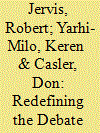

|
|
|
|
|
| Summary/Abstract |
A wave of recent scholarship has breathed new life into the study of reputation and credibility in international politics. In this review article, the authors welcome this development while offering a framework for evaluating collective progress, a series of related critiques, and a set of suggestions for future research. The article details how the books under review represent an important step toward consensus on the importance of reputation in world politics, elucidating scope conditions for when reputational inferences are likely to be most salient. The authors argue that despite the significant accomplishments of recent studies, the scholarly record remains thin on the psychology of the perceiver and is instead focused on situational factors at the expense of dispositional variables and is rather myopically oriented toward reputation for resolve to the exclusion of other important types. Despite its contributions, the new literature still falls short of a full explanation for how actors draw inferences about reputation. These remaining theoretical challenges demand scholarly attention and suggest a role for psychology in filling some of the gaps.
|
|
|
|
|
|
|
|
|
|
|
|
|
|
|
|
| 10 |
ID:
139803
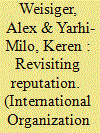

|
|
|
|
|
| Summary/Abstract |
Policy-makers and political scientists have long believed that states must make policy with an eye to maintaining a good reputation, especially a good reputation for resolve. Recent work, however, has argued that reputations for resolve do not form, and hence that past actions do not influence observers' behavior in subsequent interactions. This conclusion is theoretically problematic and unsupported by the evidence offered by reputation critics. In particular, juxtaposing reputation for resolve to power and interests is misleading when past actions influence observers' beliefs about interests, while the common approach of looking at crisis decision making misses the impact of reputation on general deterrence. We thus derive hypotheses about conflict onset from both the arguments of reputation critics and the logic of more standard reputation arguments, which we put to statistical test. We find that past action is closely connected to subsequent dispute initiation and that the effects of reputation generalize beyond the immediate circumstances of the past dispute. Although reputation is not all-important, leaders are well advised to consider the reputational implications of policy decisions in international conflict.
|
|
|
|
|
|
|
|
|
|
|
|
|
|
|
|
| 11 |
ID:
149253
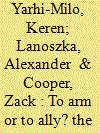

|
|
|
|
|
| Summary/Abstract |
How do great powers decide whether to provide arms to or form alliances with client states? This “patron's dilemma” revolves around a decision about how to best provide security to clients without becoming entrapped in unwanted conflicts. Strong commitments worsen the risk of entrapment, whereas weak commitments intensify fears of abandonment. This traditional alliance dilemma can be addressed through the provision of arms and alliances. Great power patrons primarily make such decisions on the basis of two factors: first, the extent to which the patron believes it and its client have common security interests; and second, whether the patron believes that its client has sufficient military capabilities to deter its main adversary without the patron's assistance. Patrons assess the degree of shared threat and the local balances of capabilities in determining whether to support their clients with arms, alliances, or both. As demonstrated in the U.S. provision of security goods to Taiwan and Israel during the Cold War, this strategic logic explains how great powers manage the patron's dilemma.
|
|
|
|
|
|
|
|
|
|
|
|
|
|
|
|
| 12 |
ID:
176512


|
|
|
|
|
| Summary/Abstract |
Why do aligned states sometimes disclose secret information about their miitary plans to use force, whereas other times they choose to deceive their partners? The state initiating these plans may choose among four information-sharing strategies: collusion, compartmentalization, concealment, and lying. Three main considerations shape its decision: the state's assessment of whether it needs its partner's capabilities to succeed at the military mission, the state's perception of whether the partner will be willing to support the state in the requested role, and the state's anticipated deception costs for not fully informing its partner state. Several cases illustrate how these strategies are chosen: Israel, Britain, and France's decision to use force against Egypt during the Suez Crisis (collusion between France and Israel, and concealment vis-à-vis the United States); Israel's 2007 bombing of Syria's al Kibar reactor (compartmentalization); and Israel's deliberations whether to attack Iran's nuclear reactor (lying). These strategies have implications for intra-alliance restraint and contribute to understanding deception and secrecy between allies.
|
|
|
|
|
|
|
|
|
|
|
|
|
|
|
|
| 13 |
ID:
123392


|
|
|
|
|
| Publication |
2013.
|
| Summary/Abstract |
Private diplomacy and secret agreements among adversaries are major features of international relations. Sometimes secret reassurance has resulted in cooperation and even peace between longtime adversaries. Yet rationalist theories consider private diplomatic communication as cheap talk. How do we explain this gap between theoretical expectations and the empirical record? I offer a theory that explains how, why, and when a leader may convince an enemy that his private reassurances are credible even when they are not costly to undertake. I also account for the conditions under which recipients of such reassurance infer the leader's benign intentions from these secret interactions. I claim that leaders engage in secret reassurance with the enemy when they face significant domestic opposition. The adversary can leverage the initiator's domestic vulnerability by revealing the secret reassurance, thereby imposing domestic punishment on the initiator. Further, by entering into private or secret negotiations and offering their adversary such leverage, initiators generate "autonomous risk" that exists beyond their control. I evaluate this theory against two empirical cases. The first case looks at Richard Nixon's secret assurances to the Chinese leadership in 1972. The second examines the secret negotiations between Israeli officials and the leadership of the Palestine Liberation Organization that ended with the signing of the Oslo I Accord in 1993.
|
|
|
|
|
|
|
|
|
|
|
|
|
|
|
|
| 14 |
ID:
162441
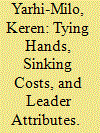

|
|
|
|
|
| Summary/Abstract |
Do costly signals work? Despite their widespread popularity, both hands-tying and sunk-cost signaling have come under criticism, and there’s little direct evidence that leaders understand costly signals the way our models tell us they should. We present evidence from a survey experiment fielded on a unique sample of elite decision makers from the Israeli Knesset. We find that both types of costly signaling are effective in shaping assessments of resolve for both leaders and the public. However, although theories of signaling tend to assume homogenous audiences, we show that leaders vary significantly in how credible they perceive signals to be, depending on their foreign policy dispositions, rather than their levels of military or political experience. Our results thus encourage international relations scholars to more fully bring heterogeneous recipients into our theories of signaling and point to the important role of dispositional orientations for the study of leaders.
|
|
|
|
|
|
|
|
|
|
|
|
|
|
|
|
| 15 |
ID:
189957


|
|
|
|
|
| Summary/Abstract |
It is a common stereotype that leaders lie, but for all our beliefs about how normal it is for a president to lie to the public we know next to nothing about how voters might actually view this conduct. Drawing from literature in behavioral economics, we theorize that voters apply their attitudes towards interpersonal lies when judging leaders, with people who see lying as more socially acceptable being less willing to punish leaders for exhibiting this behavior. Using a novel vignette-style survey experiment, we find strong support for our theory: despite widespread willingness to punish leaders who lie, individuals high in Machiavellianism and Self-Monitoring are far less willing to punish presidents for lying than their low-type peers, and in some cases do not punish at all. Using robustness checks and causal mediation analysis, we confirm that views regarding the moral acceptability of lying drive responses to presidential deception.
|
|
|
|
|
|
|
|
|
|
|
|
|
|
|
|
|
|
|
|
|